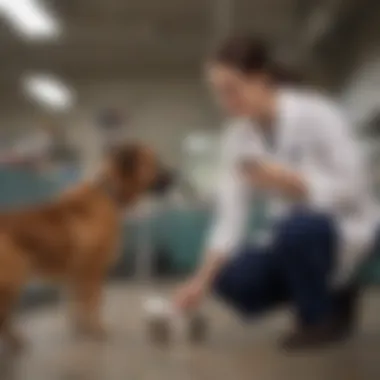Understanding Random Diarrhea in Dogs: Causes and Care


Intro
Random diarrhea in dogs can be a perplexing and concerning issue for pet owners. Understanding the potential causes is crucial to address the problem effectively. Diarrhea may stem from various factors, including dietary indiscretions, infections, or underlying health conditions. Recognizing these causes can help in managing your dog's digestive health. This article provides a thorough examination of random diarrhea, offering insights into management strategies and preventive measures.
Understanding Your Pet
Different breeds have distinct traits that can influence their health and behavior. Understanding these traits can help in identifying potential issues, including digestive problems.
Breed Traits
Some breeds may be more predisposed to gastrointestinal issues than others. For instance, Boxers and French Bulldogs often face digestive challenges due to their unique anatomy. Identifying these traits can lead to better care for your pet.
Common Temperaments
A dog’s temperament can also play a role in its overall health. Stressful environments or changes in routine can trigger digestive issues. Understanding your dog's temperament aids in managing anxiety that might contribute to diarrhea.
Special Needs
Certain breeds have specific health requirements. For example, senior dogs may have more delicate digestive systems and need special diets. It's essential to tailor nutrition to the needs of your particular dog.
Pet Care Essentials
Caring for your dog's overall health can directly impact their digestive well-being. Key areas include nutrition, grooming, and regular health check-ups.
Nutrition and Feeding Guidelines
Feeding your dog high-quality food is essential for maintaining digestive health. Aim for a balanced diet rich in fiber. Avoid sudden changes in diet, as they can upset the stomach, leading to diarrhea.
Grooming Tips and Techniques
Regular grooming can help identify any underlying health issues. Checking your dog's fur and skin can alert you to potential allergies or skin infections that may lead to gastrointestinal problems.
Health and Wellness
Routine vet visits are vital for monitoring your dog's health. Keeping up-to-date with vaccinations and deworming is essential. Regular check-ups can catch problems early before they escalate.
Training and Behavior
Training plays a crucial role in a dog's overall well-being. Behavioral problems can sometimes manifest as physical issues.
Basic Training Techniques
Basic commands and training can reduce anxiety in dogs, which may help prevent diarrhea triggered by stress. Consistency is key in training efforts.
Behavioral Problems and Solutions
Address behavioral issues promptly. Problems like separation anxiety can lead to physical symptoms, including digestive upset. Seeking professional help can be beneficial.
Mental Stimulation Activities
Providing mental stimulation through toys or puzzles can promote a relaxed, well-adjusted dog. Engaged dogs are less likely to develop anxiety-related issues.
Engaging with Your Pet
Spending quality time with your dog fosters a strong bond and promotes emotional health.
Interactive Games and Toys
Games that require interaction, such as fetch or hide-and-seek, can keep your dog physically active and mentally stimulated. This can reduce stress-related issues, including diarrhea.
Safe Outdoor Activities
Taking walks in safe environments allows your dog to explore while also exercising. Exercise can promote healthy digestion.


Family-Friendly Pet Interactions
Encouraging family members to interact with your dog can create a supportive atmosphere. Positive interactions can help reduce anxiety in dogs.
Pet Adoption and Integration
Understanding pet adoption is crucial for potential owners. A seamless integration process can set the stage for a healthy relationship.
Choosing the Right Pet for Your Lifestyle
Consider your lifestyle when adopting. Active dogs may require more exercise, whereas some breeds are more sedentary. Selecting a breed that matches your lifestyle can prevent stress on both dog and owner.
Preparing Your Home for a New Pet
Make your home safe and welcoming. Dog-proof your living space to prevent accidents or injuries, which can add stress.
Tips for Smooth Foreword
Gradually introducing your new pet to the household helps minimize stress. Monitor interactions with other pets to ensure everyone's comfort.
It is essential for dog owners to recognize signs of distress in their pets. Observing changes in behavior, appetite, or digestion can signal when veterinary intervention is necessary.
By understanding the various dimensions of your dog’s health, you can take proactive steps to prevent and manage digestive issues. Knowing when to consult a veterinarian is also paramount in preserving their quality of life.
Preface to Random Diarrhea in Dogs
Diarrhea in dogs is not just a mere inconvenience; it is an important symptom that can reflect underlying health issues. Understanding random diarrhea is crucial for any dog owner, as it impacts the overall well-being of the animal. This section will explore the elements, benefits, and considerations surrounding this issue, emphasizing why awareness is essential.
Understanding Diarrhea
Diarrhea itself is characterized by an increase in the frequency of bowel movements, softer stools, and sometimes a sudden change in the dog's usual bathroom habits. For pet owners, noticing these changes can be stressful. Drawing clear distinctions between intermittent episodes and chronic diarrhea is vital.
Acute diarrhea can stem from a range of causes such as dietary changes, infections, and more. However, random diarrhea could happen without any apparent reason. The dog might seem well otherwise. Understanding the distinctions can guide pet owners toward more effective management.
The digestive health of a dog is crucial for its overall health. Poor digestion can lead to weight loss, dehydration, and even lethargy. Being informed allows dog owners to act promptly, potentially preventing more severe complications down the line.
Prevalence and Significance
Random diarrhea in dogs is a common occurrence, and understanding its prevalence is essential. While it may seem trivial at times, the significance should not be overlooked. Many dogs experience diarrhea at least once in their life, with some having recurring episodes.
Recognizing when diarrhea is not just a simple case of upset stomach is vital. In some instances, it might signify infections or other diseases like pancreatitis. The need for prompt action can mean the difference between a short-lived ailment and a serious health crisis.
Common Causes of Diarrhea in Dogs
Understanding the common causes of diarrhea in dogs is crucial for any dog owner. Diarrhea might seem like a minor annoyance, but it can often indicate more severe underlying issues. Therefore, knowing the causes can guide owners in making informed decisions. This section highlights the importance of recognizing these triggers, which aids in timely management and prevention strategies.
Dietary Indiscretion
Dietary indiscretion is one of the leading causes of diarrhea in dogs. This term refers to when dogs consume inappropriate or unexpected foods. Dogs are known for their curious nature, often leading them to scavenge through rubbish or eat something not suitable for their digestion. An abrupt change in diet, even when the new food is high-quality, can cause stress in their gastrointestinal system.
Common signs of dietary indiscretion include watery stools and occasional vomiting. Pet owners should observe their dog's eating habits closely.
- Monitor Their Food: Ensure to provide balanced meals that fit your dog’s needs.
- Avoid Table Scraps: Human food can upset their stomach.
Signs of distress in your dog after eating should not be ignored. If you notice changes in their stool, it may be an indicator of dietary issues.
Infections and Parasites
Infections and parasites are significant causes of diarrhea in dogs. Infections can arise from bacterial or viral agents, such as parvovirus or salmonella. They often lead to more serious health conditions, making early identification essential.
Parasites like roundworms and giardia also frequently infest dogs, especially if they are not on a proper prevention regimen. These organisms reside in the intestines and disrupt normal digestion.
- Recognize Symptoms: Look out for lethargy, weight loss, or poor coat condition, along with diarrhea.
- Veterinary Testing: A stool sample can help determine the presence of parasites or infections.


Maintaining a proactive monitoring schedule can help prevent severe health implications.
Medications and Toxins
The introduction of certain medications can also trigger diarrhea. For example, antibiotics may disrupt the natural balance of bacteria in the gut, leading to gastrointestinal upset.
Moreover, exposure to toxins, such as chocolate or household chemicals, can provoke severe digestive issues. Pet owners should remain vigilant about their dog’s environment and medication usage.
- Consult Your Vet: Before administering any medications, it’s wise to consult with a veterinarian.
- Keep Toxins Away: Maintain a safe environment devoid of harmful substances.
Recognizing the interplay between medications and digestive health is critical. Always monitor your dog's response to any new treatment.
Underlying Health Conditions
Underlying health conditions can also manifest as diarrhea. For instance, diseases like pancreatitis, liver dysfunction, or even endocrine disorders can significantly affect digestive stability. This can make identifying the cause more challenging, as symptoms may not be straightforward.
- Regular Check-Ups: Consistent vet visits can help catch any health issues early.
- Observe Behavioral Changes: Increased thirst or appetite may require further investigation.
A diagnostic approach is often essential in these cases. Owners should be prepared to discuss any changes in their dog’s behavior or health with their vet comprehensively.
Understanding these common causes equips dog owners to discern when their pet's health might require intervention. This proactive approach can lead to better management strategies and prevent future incidents of diarrhea.
Identifying the Severity of Diarrhea
Identifying the severity of diarrhea in dogs is critical for effective management and treatment. Diarrhea can range from mild to severe, and knowing where a dog's symptoms fall within this spectrum can help pet owners decide the appropriate course of action. Not every case of diarrhea is cause for alarm; however, understanding the symptoms and their implications can prevent potentially serious health issues.
Assessing Symptoms
When assessing symptoms of diarrhea, observe your dog's fecal consistency, frequency, and possible accompanying signs. Here are some key indicators of severity:
- Fecal Consistency: Loose stool may be less concerning than watery or entirely liquid stool. Watery diarrhea often indicates a more serious condition.
- Frequency: If a dog defecates several times an hour, it may point to a more urgent issue.
- Color and Odor: Unusual colors, such as red or black, or particularly foul-smelling stools can signify health complications.
- Accompanying Symptoms: Look for other signs such as vomiting, lethargy, or fever. These may indicate a systemic illness.
Consider keeping a log of your dog’s symptoms. Detailed records help veterinarians in diagnosing the cause and determining the necessary interventions. If symptoms persist beyond a day or two, it becomes crucial to reassess the situation.
When to Seek Veterinary Attention
Knowing when to seek veterinary attention is paramount. Not all cases of diarrhea require professional intervention, but certain conditions warrant immediate care:
- Persistent Diarrhea: If diarrhea lasts more than 24 hours, veterinary evaluation is advisable.
- Severe Dehydration: Symptoms can include excessive thirst, dry gums, or skin that remains tented when pinched.
- Blood in Stool: Seeing blood is always a red flag and should prompt an immediate veterinary visit.
- Accompanied by Vomiting: If diarrhea occurs alongside frequent vomiting, it could mean a serious underlying issue.
- Age Factor: Puppies and older dogs are at greater risk of rapid dehydration and may require urgent care sooner.
Remember, timely intervention can greatly improve the prognosis. If you are uncertain, it is better to err on the side of caution and consult a veterinarian.
By observing symptoms closely and knowing when to look for professional help, pet owners can ensure their dogs receive the necessary care to avoid serious health complications. This vigilance can lead to better outcomes and promote overall well-being.
Diagnostic Approaches
Understanding the diagnostic processes is crucial in effectively managing and preventing random diarrhea in dogs. A thorough veterinary assessment can identify the underlying cause. This section provides insights into the importance of proper diagnostic approaches and discusses the key elements involved.
Veterinary Examination
The veterinary examination is often the first step in diagnosing diarrhea in dogs. During this process, the veterinarian assesses the dog’s overall health through a comprehensive physical examination. This includes observing the pet's hydration status, checking for any signs of distress, and palpating the abdomen to feel for any abnormalities.
Veterinarians may ask detailed questions regarding the dog's recent diet, behavior, and any possible exposure to toxins or sick animals. Collecting this information helps to formulate potential causes of diarrhea. This stage is vital, as it helps narrow down the possibilities before any further tests are recommended. Often, a physical exam can reveal hints of underlying issues such as infections, parasites, or other health conditions.
Clinical observations during this examination can play a significant role in determining the next steps. A vet might be able to detect if the diarrhea is acute or chronic, thus influencing the course of treatment. In sum, the veterinary examination lays the foundation for effective diagnosis and subsequent interventions.
Laboratory Tests
Laboratory tests further aid in understanding the cause of diarrhea. They can include a variety of assessments, such as fecal analysis, blood work, and urinalysis. Each test serves a distinct purpose and can offer insights that a physical examination may not capture.
- Fecal Analysis: This test examines the stool for presence of parasites, bacteria, or abnormal substances. It helps to identify parasitic infections that often result in diarrhea.
- Blood Tests: Blood work helps assess the overall health of the dog. It can indicate issues like systemic infections or organ dysfunction. Abnormal blood results can direct focus to specific areas, such as liver or kidney function.
- Urinalysis: This can also signal metabolic disorders or infections that might contribute to gastrointestinal distress.
The combined results from laboratory tests can confirm or rule out suspicions raised during the veterinary examination. These diagnostic approaches are essential as they guide further management plans, ensuring that treatment is tailored to the dog's specific needs.


Management of Diarrhea in Dogs
Managing diarrhea in dogs is crucial for both the well-being of the pet and the peace of mind of the owner. Diarrhea, while often not a serious condition on its own, can lead to dehydration and indicate underlying health issues. Timely and effective management helps mitigate risks and promotes quicker recovery. Thus, understanding the various approaches to manage diarrhea is essential.
Dietary Modifications
Diet plays a significant role in the digestive health of dogs. When a dog experiences diarrhea, dietary modifications may be necessary. It is advisable to start with a bland diet, such as boiled chicken and white rice. This can help to stabilize their digestion. Slowly reintroducing their regular food after 24 to 48 hours can also aid in monitoring the dog’s response.
Key elements of dietary modifications include:
- Gradual Changes: Making sudden changes to a dog’s diet can exacerbate digestive issues. Gradually introduce new foods over several days.
- Hydration: Ensure that your dog has access to fresh water at all times to prevent dehydration, particularly when suffering from diarrhea.
- Fiber: Incorporating soluble fiber, found in canned pumpkin or sweet potatoes, may help firm up stools.
Medications and Treatments
In some cases, over-the-counter medications can provide relief. Products containing bismuth subsalicylate, such as Pepto-Bismol, can be helpful in alleviating mild diarrhea, but it is crucial to consult a veterinarian before administering any medication. Some cases may require prescription medication or treatments that target specific conditions.
Considerations for medications and treatments:
- Veterinary Guidance: Always seek professional advice before administering any treatment, as incorrect dosages can be harmful.
- Parasite Control: If parasites are the cause, medications specifically designed to treat them will be necessary.
- Underlying Conditions: Treating underlying health problems may be essential if diarrhea persists despite medication.
Home Care Strategies
Home care is an essential aspect of managing diarrhea in dogs. Owners can implement several effective strategies to support their pets during recovery.
- Monitor Symptoms: Keeping a record of your dog’s symptoms, including the frequency of diarrhea and any additional symptoms, is critical for evaluating their condition.
- Rest: Providing a quiet space for your dog to relax and recover can enhance their healing process. Stress often exacerbates digestive issues.
- Observe Behavior: Pay attention to your dog’s energy levels and overall behavior. If they seem lethargic or show signs of pain, veterinary intervention may be necessary.
Proper management of diarrhea promotes recovery and reduces the chance of future episodes.
Preventing Future Episodes
Preventing future episodes of diarrhea in dogs is a crucial aspect of maintaining their overall health and well-being. By taking proactive measures, pet owners can significantly reduce the chances of their dogs experiencing digestive disturbances. Understanding this aspect involves several key points: promoting a balanced diet, ensuring regular health check-ups, and implementing vaccinations and effective parasite control. Each of these strategies plays a vital role in fostering a healthier gastrointestinal tract for pets.
Maintaining a Balanced Diet
A balanced diet is fundamental for a dog’s digestive health. Dogs require the right mix of nutrients to function optimally. Poor diet can lead to various gastrointestinal issues, including diarrhea. Owners should prioritize high-quality dog food that offers complete nutrition, suitable for their dog's age, size, and health status.
It is essential to limit table scraps and avoid sudden dietary changes. Gradually introducing new foods helps the digestive system adapt. If needed, consult with a veterinarian to create a customized diet plan. Regularly review the food label to ensure no harmful ingredients are present. Here are a few points to consider for a balanced diet:
- Choose dog foods with whole ingredients and minimal fillers.
- Pay attention to the protein source; it should come from reputable suppliers.
- Include sources of fiber such as sweet potatoes or pumpkin for digestion improvement.
Regular Health Check-Ups
Routine veterinary check-ups are important for identifying potential health issues before they escalate. Dogs may not show immediate signs of health problems, so preventive care is key. Regular visits allow veterinarians to monitor the dog's overall health, address any concerns, and ensure vaccination schedules are followed.
During these visits, discuss any changes in the dog’s appetite, weight, or behavior. These could be indicators of underlying health issues that need addressing. Owners should also inquire about recommended dietary supplements that could aid in supporting digestive health.
- Schedule veterinary appointments at least once a year for adult dogs.
- Keep a record of vaccinations and treatments.
- Be vigilant about signs of illness, such as lethargy or changes in stool consistency.
Vaccination and Parasite Control
Vaccinations and parasite control are vital components in the prevention of digestive issues in dogs. Certain infectious diseases linked with gastrointestinal stress can be mitigated through vaccination. Moreover, parasites like Giardia and roundworms lead to significant digestive disturbances.
Pet owners should maintain an up-to-date vaccination schedule. Similarly, regular deworming treatments can lower the risk of parasite infestations. These proactive measures can aid in avoiding conditions that lead to random diarrhea.
- Work with a veterinarian to develop a vaccination schedule tailored for your pet.
- Apply topical or oral treatments based on the severity and risk factors of parasitic infections.
Preventing future episodes of diarrhea in dogs largely relies on the owner’s commitment to healthful management strategies. By focusing on diet, routine check-ups, and preventive vaccinations, the risks can be greatly minimized.
Culmination
In addressing the matter of random diarrhea in dogs, the concluding remarks encapsulate the critical insights gained throughout this article. Understanding this condition is of paramount importance for pet owners. The consequences of untreated diarrhea can extend beyond mere inconvenience; they can lead to serious health issues for dogs. This highlights the necessity of timely intervention and informed decision-making.
Summary of Key Points
- Causes of Diarrhea: Among the various causes, dietary indiscretion, infections, medications, and preexisting health issues stand out. Recognizing these can assist owners in identifying potential triggers.
- Identifying Severity: It is essential for pet owners to assess symptoms accurately. Knowing when to seek veterinary attention can prevent complications.
- Management Strategies: Dietary modifications and appropriate home care are crucial. Moreover, knowledge of medications can help streamline treatment options.
- Preventive Measures: Regular health check-ups and proper vaccine schedules underscore the importance of maintaining a dog's digestive health through proactive measures.
Final Recommendations
- Consult a Veterinarian: Always consult a veterinarian if symptoms persist. Professional guidance is invaluable for accurate diagnosis and treatment plans.
- Foster a Balanced Diet: Focus on a balanced diet tailored to your dog's specific needs. This can mitigate occurrences of digestive upset.
- Monitor Health Regularly: Keep a close eye on your dog's health and well-being. Regular check-ups can identify potential problems before they escalate.
- Educate Yourself: Stay informed on various health topics related to your pet. Websites such as Wikipedia and Britannica are good places to start.
Understanding diarrhea in dogs is not just about managing a symptom. It is about ensuring overall health and longevity for our beloved pets. A proactive approach can greatly enhance the quality of life for dogs, allowing them to thrive and enjoy their time with us.



